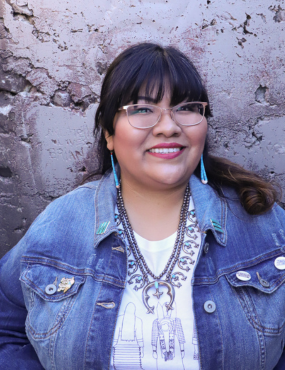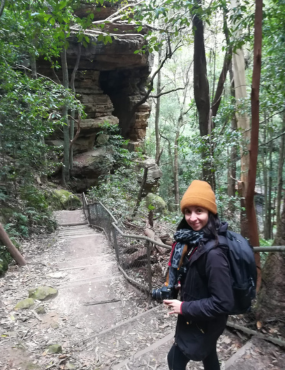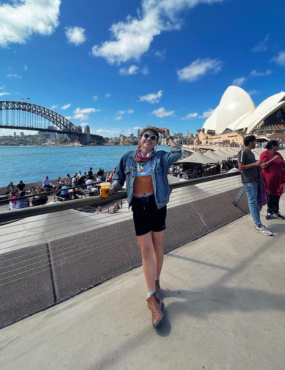Ahead of the International Day of the World’s Indigenous Peoples on 9 August, we speak to three cotutelle students from the Department of Indigenous Studies about their important PhD research and some of their Macquarie University highlights.
Nicholet Deschine Parkhurst, Macquarie University and Arizona State University

- What made you want to study at Macquarie?
I started the cotutelle program in June 2023 and have only been in Sydney for almost two months now. I have been engaging in the field of Indigenous social media use during my doctoral studies at Arizona State University and Professor Bronwyn Carlson, being a leader in this field, was one of the researchers my work intersected with. Professor Carlson has supported my research over the years, which has led to various opportunities including an invitation to contribute a chapter to the book, Indigenous Peoples Rise Up: The Global Ascendency of Social Media Activism. I decided to come to Macquarie University to work with Professor Carlson and to be further mentored by her.
- What is your PhD about?
I am pursuing a PhD in Indigenous Studies at Macquarie and a PhD in Justice Studies at Arizona State University. My doctoral research is interested in Indigenous peoples’ use of social media for Indigenous justice movements related to the rights of water, land and sacred sites. More specifically, I am studying the Standing Rock social justice movement, known as the NoDAPL movement (No Dakota Access Pipeline), and how social media connected Indigenous peoples globally.
I am Indigenous; I’m of the Standing Rock Sioux Tribe and of the Navajo Nation, which are located in what is known as the United States of America. While my research considers global Indigenous solidarity around issues of Indigenous human rights, the specific movement of focus in my research, the NoDAPL movement, has personal meaning to me as the pipeline directly impacts the community of my maternal family. During the NoDAPL protests I witnessed Indigenous peoples coming from all over the globe, either physically coming to the Standing Rock Sioux Tribe or virtually offering their support.
- What have been some of your highlights at Macquarie?
A major highlight was participating in the Indigenous Higher Degree Research Internship Writing Retreat last month. We attended workshops on writing op-eds, research proposals and grants, and we had dedicated time to write. Not only did I feel my research interests were validated, but I also felt supported as an Indigenous scholar. This was also a great opportunity to get to know other Indigenous scholars pursuing research at Macquarie University as well as my new colleagues in the Department of Indigenous Studies.
- What are your reflections on the cotutelle program?
I was honoured to be invited by Professor Carlson to study at Macquarie as a cotutelle PhD student and to broaden my intellectual genealogy. Participating in this program not only provides me the opportunity to connect with Indigenous peoples here, in what is known as Australia, to personally learn of the issues they face due to settler colonialism but also to hopefully share their perspectives in my research project. I also think the cotutelle provides value as an Indigenous scholar by supporting our Indigenous connections. The Department of Indigenous Studies has become community for me, and I’m excited for the possibilities of research collaboration and friendship.
- What are you focused on for the rest of the year and into 2024?
I will be continuing as a cotutelle PhD student until my degree completion, which is estimated to be in May 2025. I have many goals to reach in the next year, including receiving ethics approval for my research proposal and starting data collection. The Department of Indigenous Studies has offered other opportunities to continue with the Indigenous HDR Internship, to tutor a class, and to write an article for publication. It’s going to a be a busy yet productive year!
Marcela Huilcán, Macquarie University and University of Groningen

- How long have you been at Macquarie and what made you decide to study here?
I started my PhD in September 2020 at the University of Groningen in the Netherlands. I was supposed to start at Macquarie in September 2021; however, due to the COVID-19 pandemic, I had to start as an off-site enrolment and was only able to travel to Sydney in April 2022.
I am a Mapuche woman [the Mapuche are an Indigenous Nation from South America]. I was born and raised in Santiago, Chile. In 2018, I moved to the Netherlands to do a Master of Arts in Multilingualism at the University of Groningen, during which I assisted in a collaborative research project between the University of Groningen and Macquarie. During this time, I travelled to Sydney where I met Professor Bronwyn Carlson and was introduced to the Department of Indigenous Studies. I experienced a new lens on academic life as an Indigenous person. I met wonderful and empowered scholars and saw the possibility of building a bridge between this side of the world and the one where I grew up. Indigenous communities in South America have little institutional support and while there is still so much work to do in supporting Indigenous students in Australia, and so much work to fill in the gap between Indigenous peoples’ and settlers' societies, the situation is more optimistic. This gave me hope and ideas to take back to my own community. A PhD opportunity arose and I thought it was a fantastic chance to work on a research project that could potentially build bridges between Indigenous linguistic communities across the world.
- What is your PhD about?
My field of study is sociolinguistics. My PhD looks at language attitudes and ideologies of Indigenous communities in NSW and central-South Chile. Within this context, I am specifically exploring the role that these communities assign to digital technologies in their language revitalisation contexts.
- What have been some of your highlights at Macquarie?
Macquarie University has an amazing educational environment, a beautiful campus, many educational resources to support your research and job opportunities related to your field. I was able to teach a class, Indigenous Research Methodologies, which was a fantastic experience. I particularly enjoyed the insightful discussions with students. It was an absolute highlight of my time at Macquarie.
- What are your reflections on the cotutelle program?
Cotutelle programs are a wonderful opportunity for students to expand their knowledge and learn from academics in different parts of the world. The program allows you to engage in activities with the institution you are in, develop professional relationships with colleagues, and become deeply acquainted with the communities.
The Department of Indigenous Studies specifically is a constellation of remarkable scholars who strengthen your academic and research skills and help you grow as an Indigenous scholar. I had the opportunity to travel to different cities across the coast of NSW where I met such wonderful people. The participants of my study were so welcoming and supportive, and I only have words of gratitude for them. Thanks to them, I was able to collect the relevant data for my research, learn about Aboriginal communities in NSW, the amazing language revitalisation work they are doing, and connect on a different level with their beautiful Aboriginal lands.
- What are you focused on for the rest of the year and into 2024?
I am currently back in the Netherlands to complete my PhD and would then like to continue with a postdoc. Right now, my focus is on writing the chapters of my dissertation. Sometimes I feel like the crazy cat from the famous GIF that is constantly typing away!
Souksavanh Keovorabouth, Macquarie University and Oregon State University

- How long have you been at Macquarie and what made you decide to study here?
I started my PhD at Oregon State University in 2019 and arrived at Macquarie in February last year. During my time at Oregon State University, I met Professor Bronwyn Carlson, Dr Andrew Farrell and Madi Day and Professor Carlson encouraged me to apply for the cotutelle program – the rest is history! I was actually accepted into both the University of Arizona and Oregon State University. The University of Arizona is closer to my hometown of Phoenix, but when deciding which offer to accept, I felt like something was calling me to Oregon State. If I didn’t decide to make the move to Oregon I probably would never have met Bronwyn, Andy and Madi, and might never have come to Macquarie. I put it all down to fate.
- What is your PhD about?
My PhD research at Oregon State University explores women, gender and sexuality studies while my PhD at Macquarie argues that urbanisation is a settler colonial tool that perpetuates racialised, gendered, and sexualised violence onto Indigenous Queer, Trans, and Two-Spirit peoples. My focus is on Phoenix, but I draw on a global Indigenous network of scholarship. The findings show Phoenix as both a place of belonging and at times, a place of violence but it’s not a binary and rather can be both at once.
- What have been some of your highlights at Macquarie?
I’ve definitely had moments of loneliness and feeling home sick, but overall, my time at Macquarie has been amazing. I’ve been able to attend three writing retreats, work on various research projects, travel to different communities and attend several conferences. I have had my own work published and was supported and encouraged to pursue opportunities that I might not have otherwise, including working as lead editor on a chapter for the Journal of Global Indigeneity. I have truly gained a whole new perspective on academia and research, which I can take home with me.
- What are your reflections on the cotutelle program?
The cotutelle has allowed me to create a global network of Indigenous scholars and activists that I know I will continue to stay in contact with. I have been afforded opportunities that I wouldn’t have such as connections and opportunities to join research, submit articles, and attend writing retreats. These have been invaluable for my research and academic journey.
- What are you focused on for the rest of the year and into 2024?
I’ve just submitted my PhD and will be returning to the US this month to take up a role as an Assistant Professor at Northern Arizona University. I’ll be teaching in both the Department of Women and Gender Studies, and the Department of Applied Indigenous Studies, which is a perfect alignment to my research expertise. I’m also working to turn my PhD thesis into a book, and expand my methodology into more areas in Arizona and develop a framework for people to apply in their own cities. I’m looking forward to publishing more of my own work, including a forthcoming book chapter and upcoming projects on Disney and Indigenous representation, Indigenous Trans Gender Euphoria, and continuing my research on Queer Indigenous Urban Studies. I’ve also been invited to the committee for SEXtember at UNSW.